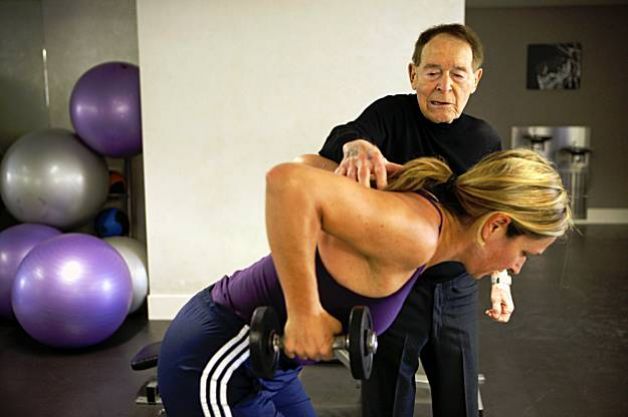Lean, Tone, and Strong: The Benefits of Resistance Training
 “The only way you can hurt the body is not to use it.”
“The only way you can hurt the body is not to use it.”-Jack LaLanne 1914 – 2011
If any of you have belonged to a gym for any length of time you’ve invariably seen those die hard cardio fanatics who stake claim on “their” machine to spend endless hours on one piece of cardio equipment like the treadmill or elliptical, and usually while reading a book (by the way, if you can read while you’re on a cardio machine, you’re not really doing cardio). While cardiovascular training should certainly have its righteous spot in our training repertoire, it shouldn’t be considered the end-all-be-all to complete and balanced training.
Now, before you say to yourself “good, I don’t have to do any more cardio” I encourage you to continue with your cardiovascular training, but as with all good things, in moderation. Cardiovascular exercise is any activity involving the major muscle groups that increases your heart rate like jogging, cycling, and swimming. Among dozens of other benefits, cardiovascular training helps to increase the strength of the heart muscle, increase lung capacity, increase stroke volume (the amount of blood pumped with each beat), increase oxygen uptake, decrease stress, and decrease blood pressure.
Another benefit of cardiovascular exercise is caloric burn. It is for this one benefit that the aforementioned cardio-maniac is seen at the gym doing hours upon hours of cardio but without much change in the way their body looks even after years of training. Someone who has a “cardio body” will usually look overly thin, flabby/soft without much muscle tone, and be very weak. Amazingly enough, these people usually have a higher percentage of body fat than those who do resistance training in addition to their oftentimes significantly shorter cardio routines.
One area of fitness that is often overlooked, particularly in females is resistance training. While cardio can burn calories during actual performance, there isn’t much in the way of additional caloric burn after the exercise is complete. In contrast, resistance training helps to build muscle which is otherwise known as our “metabolically active tissue”. This means that for every one pound of muscle you have, you burn an additional 50 calories per day! Yahoo! Where extended cardio routines break down this metabolically active muscle tissue, resistance training will help to build it up, thus increasing your basal metabolic rate—the rate at which your body burns calories even while at rest. So you can throw away the idea that resistance training will make you “bulk up” like a Ukrainian wrestler on steroids. In contrast, it is the key to making you lean and is the vital ingredient in maintaining a healthy weight.
Resistance training is also a key component of maintaining healthy bone density. Bone will form in lines of stress, so when muscles pull on the bones during weight-lifting or other resistance training, they stimulate the bone to increase its density. Scientific studies show that resistance training is particularly helpful in increasing the bone density in the femoral shaft- the area of the hip that is most commonly broken due to brittle bones. Other studies also show in contrast that excessive cardiovascular exercise in the form of running without regular resistance training can actually decrease bone density in the upper spine, shoulders, and ribs which over time can lend the cardio-addict to a posture much like the Hunchback of Notre Dame (always a pleasant visual).
One of the more obvious benefits of resistance training is the increase of strength— perhaps why it is interchangeably called “strength training”? Like bone, muscle needs force in order to grow. You will build muscle when you place more resistance on it that it is used to. This can be achieved through weights, resistance bands, body weight (i.e. push ups, squats, pull ups) or machines at the gym. Moderate-to-high-intensityresistance training performed 2 to 3 days per week for 3 to6 months improves muscular strength and endurance in men andwomen of all ages by 25% to 100%, depending on the trainingstimulus and initial level of strength
Stronger muscles achieved through resistance training also help with balance preventing falls in both young and old alike. Strength training improves athletic performance by increasing power and stamina. Tone muscles promote joint protection by acting as a splint to keep joints in their proper alignment. Moreover, resistance training is beneficial in preventing or minimizing chronic conditions like low back pain, obesity, cardiac disease, diabetes, arthritis, hormonal disorders, and the prevention & rehabilitation of orthopedic injuries. It’s also important to note that increased strength enables independence by allowing you to open jars without asking for assistance and also builds confidence if ever a spontaneous arm wrestling competition should break out.
We naturally lose about 5% of our muscle mass every 10 years between the ages of 25 and 50. After 50, that number jumps to 2-3% muscle loss per year! Yikes! So basically, you have to train with weights just to maintain the muscle you already have or as some famous philosopher once said “move it or lose it!” I’m sure the late great Jack LaLanne would agree.
A word of caution; anything worth doing is worth doing well. If you don’t know the proper technique for resistance training, please seek the help of a certified professional to get you started with proper form and execution. It will save you time and an unnecessary trip to the orthopedic surgeon!

